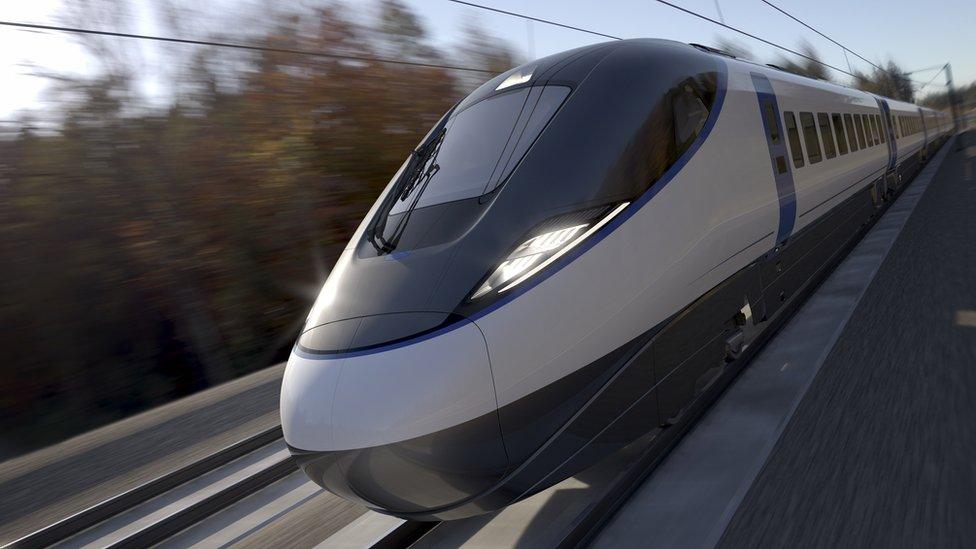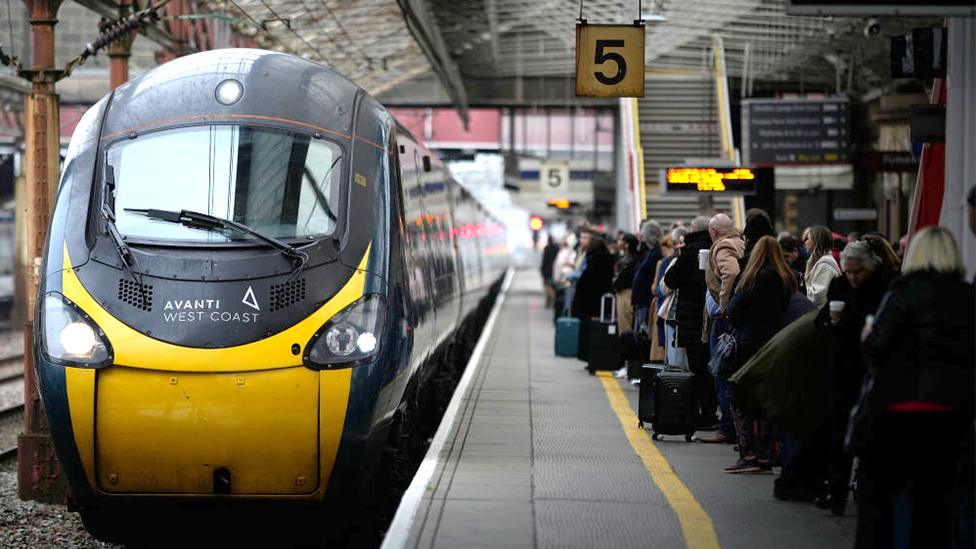New train strike dates announced by Aslef drivers' union
- Published

A fresh series of strikes has been unveiled by the main train drivers' union, Aslef, in its long-running pay dispute with 16 train companies.
The stoppages between Tuesday 30 January and Monday 5 February will affect different operators each day.
The drivers will also refuse to work overtime from Monday 29 January until Tuesday 6 February.
The first strike in this dispute by Aslef was in July 2022, and the row is now in its third calendar year.
The Rail Delivery Group - which represents the train operators - said "nobody wins" when strikes take place and called on Aslef to work with them to resolve the dispute.
The Department for Transport called the action disappointing.
Which train companies are affected on which day?
Tuesday 30 January: Southeastern, Southern, Gatwick Express, Great Northern, Thameslink, South Western Railway and SWR Island Line
Wednesday 31 January: Northern Trains, Transpennine Express
Friday 2 February: Greater Anglia, C2C, LNER
Saturday 3 February: West Midlands Trains, Avanti West Coast, East Midlands Railway
Monday 5 February: Great Western, CrossCountry, Chiltern
Operators not involved in industrial action, for example ScotRail and Transport for Wales, should run normal services.
Previously, most of the train companies involved have not been able to run any trains when drivers are on strike. A few have run a limited timetable using managers to drive trains.
There will be no strike action on Thursday 1 February or Sunday 4 February.
Aslef general secretary Mick Whelan accused ministers of not wanting to resolve the dispute, and called for the government and train companies to "come to the table with a realistic offer".
He added that a new law bringing in Minimum Service Levels "won't ease industrial strife. It will likely just make it worse."
This legislation enables employers to require a certain number of staff to work to ensure some service. In the case of passenger rail services, that would be 40% of the timetable.
It is unclear at this point whether any of the train companies will seek to implement them for these strikes. If they do, it appears this would be their first test.
Neil Todd from the Trade Union Law Group at Thompsons Solicitors pointed that although the option was available, there was no requirement for train companies to use Minimum Service Levels.
The train operators say ways of working need to change for wages to rise, because of the financial challenge facing the industry and in fairness to taxpayers. But Aslef says drivers are being asked to sacrifice working conditions in exchange for a below-inflation wage increase.
In April 2023, Aslef's executive committee rejected 4% pay rises for two years in a row, on condition that they would accept industry-wide changes to driver training, and negotiate changes to work patterns at individual operators.
There have been no formal talks since.
The government controls how much money is on the table and has the final say over what is offered. Ministers and industry negotiators have continue to urge the union to give members a vote on the latest offer.
Members of the RMT union, which represents tens of thousands of other rail workers, accepted a deal in November. This ended its long-running series of national strikes and gave staff a backdated 5% pay rise for 2022-23.
However, the current year's pay increase will be subject to changes being negotiated with individual operators. Talks are due to commence next month.
There has not been the same progress in the Aslef dispute, and drivers voted to continue strike action until the spring.
Mr Whelan has repeatedly warned that drivers are in the dispute for the long haul.
A spokesperson for the Rail Delivery Group said drivers had been made an offer which would take base salaries to nearly £65,000 for a four-day week without overtime.
"That is well above the national average and significantly more than many of our passengers that have no option to work from home are paid.
"Instead of staging more damaging industrial action, we call on the Aslef leadership to work with us to resolve this dispute and deliver a fair deal which both rewards our people, and makes the changes needed to make services more reliable."
The Department for Transport said: "Aslef is now the only rail union that is continuing to strike while refusing to put a fair and reasonable offer to its members.
"The Aslef leadership should do the right thing and let their members decide their own future, instead of deciding it for them."
The hospitality industry has issued several warnings of the damaging impact of strike action on businesses, particularly in city centres.
Kate Nicholls, chief executive of UKHospitality, said the latest action would be "significantly detrimental" to the sector.
"January and February are already two of the quieter months of the year for venues and this disruption will make it even more painful," she said.
"We estimate this set of strikes will cost hospitality almost £350m, on top of the £4bn in lost sales the sector has already had to withstand."

How will you be affected by strikes? You can get in touch by emailing haveyoursay@bbc.co.uk, external.
Please include a contact number if you are willing to speak to a BBC journalist. You can also get in touch in the following ways:
WhatsApp: +44 7756 165803
Tweet: @BBC_HaveYourSay, external
Please read our terms & conditions and privacy policy
If you are reading this page and can't see the form you will need to visit the mobile version of the BBC website to submit your question or comment or you can email us at HaveYourSay@bbc.co.uk, external. Please include your name, age and location with any submission.
Related topics
- Published11 January 2024

- Published22 December 2023
